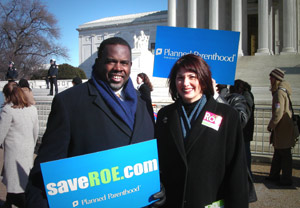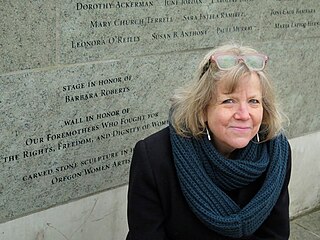Related Research Articles

The United States abortion-rights movement is a sociopolitical movement in the United States supporting the view that a woman should have the legal right to an elective abortion, meaning the right to terminate her pregnancy, and is part of a broader global abortion-rights movement. The movement consists of a variety of organizations, with no single centralized decision-making body.
The Planned Parenthood Federation of America, Inc. (PPFA), or simply Planned Parenthood, is a 501(c)(3) nonprofit organization that provides reproductive and sexual healthcare, and sexual education in the United States and globally. It is a member of the International Planned Parenthood Federation (IPPF).
The Jane Collective or Jane, officially known as the Abortion Counseling Service of Women's Liberation, was an underground service in Chicago, Illinois affiliated with the Chicago Women's Liberation Union that operated from 1969 to 1973, a time when abortion was illegal in most of the United States. The foundation of the organization was laid when Heather Booth helped her friend's sister obtain a safe abortion in 1965. Other women with unwanted pregnancies began to contact Booth after learning via word-of-mouth that she could help them. When the workload became more than what she could manage, she reached out to other activists in the women's liberation movement. The collective sought to address the increasing number of unsafe abortions being performed by untrained providers. Since illegal abortions were not only dangerous but very expensive, the founding members of the collective believed that they could provide women with safer and more affordable access to abortions.
This is a timeline of reproductive rights legislation, a chronological list of laws and legal decisions affecting human reproductive rights. Reproductive rights are a sub-set of human rights pertaining to issues of reproduction and reproductive health. These rights may include some or all of the following: the right to legal or safe abortion, the right to birth control, the right to access quality reproductive healthcare, and the right to education and access in order to make reproductive choices free from coercion, discrimination, and violence. Reproductive rights may also include the right to receive education about contraception and sexually transmitted infections, and freedom from coerced sterilization, abortion, and contraception, and protection from practices such as female genital mutilation (FGM).

Merle Hoffman is an American journalist and activist.

Leana Sheryle Wen is an American physician, author, professor, speaker, consultant, newspaper columnist and television commentator. She is former health commissioner for the city of Baltimore and former president of Planned Parenthood. She has written two books based on her experiences as a medical professional.
Abortion is the termination of human pregnancy, often performed in the first 28 weeks of pregnancy. In 1973, the United States Supreme Court in Roe v. Wade recognized a constitutional right to obtain an abortion without excessive government restriction, and in 1992 the Court in Planned Parenthood v. Casey invalidated restrictions that create an undue burden on people seeking abortions. Since then, there has continued to be an abortion debate in the United States, and some states have passed laws in the form of regulation of abortions but which have the purpose or effect of restricting its provision. The proponents of such laws argue they do not create an undue burden. Some state laws that impact the availability of abortions have been upheld by courts. In 2022, Roe and Casey were overturned by the Supreme Court in Dobbs v. Jackson Women's Health Organization, meaning that states may now regulate abortion in ways that were not previously permitted.
A medical abortion, also known as medication abortion, occurs when drugs (medication) are used to bring about an abortion. Medical abortions are an alternative to surgical abortions such as vacuum aspiration or dilation and curettage. Medical abortions are more common than surgical abortions in most places, including Europe, India, China, and the United States.
Abortion in Oklahoma is illegal unless the abortion is necessary to save the life of a pregnant woman.

Janice Kay "Jan" Haaken is an American clinical psychologist, documentarian, and professor emeritus of Community and Clinical Psychology in the Department of Psychology at Portland State University.
Abortion in Texas is illegal in most cases. A trigger law has been in effect since August 25, 2022, which bans abortion in all cases except to save the life of the mother.
Abortion in Arizona is currently legal for up to 15 weeks gestation.
Abortion in Kansas is legal. Kansas law allows for an abortion up to 20 weeks postfertilization. After that point, only in cases of life or severely compromised physical health may an abortion be performed, with this limit set on the belief that a fetus can feel pain after that point in the pregnancy. The state also had detailed abortion-specific informed consent requirement by 2007. Targeted Regulation of Abortion Providers (TRAP) law applied to medication-induced abortions and private doctor offices in addition to abortion clinics were in place by 2013. In 2015, Kansas became the first state to ban the dilation and evacuation procedure, a common second-trimester abortion procedure. State laws about abortion have been challenged at the Kansas Supreme Court and US Supreme Court level. On August 2, 2022, Kansas voters rejected a constitutional amendment that would have allowed the Republican-controlled legislature to restrict or ban abortion in Kansas, following the overturning of Roe v. Wade.
Abortion in New York is legal at all stages of pregnancy, although abortions after the point of viability require a physician's approval. Abortion was legalized up to the 24th week of pregnancy in New York (NY) in 1970, three years before it was decriminalized for the entire United States with the Supreme Court's decision in Roe v. Wade in 1973. Roe v. Wade was later overturned in 2022 by the Supreme Court in Dobbs v. Jackson Women's Health Organization. The Reproductive Health Act, passed in 2019 in New York, further allows abortions past the 24th week of pregnancy if a woman's life or health is at risk or if the fetus is not viable. However, since these exceptions are not defined by the law, and the law carries no criminal penalties, abortion is effectively legal throughout pregnancy.
Abortion in South Dakota is illegal. Anyone who induces an abortion is guilty of a Class 6 felony. An exception is included to "preserve the life of the pregnant female," given appropriate and reasonable medical judgment.
Elective abortions in Wisconsin are under dispute after the overturning of Roe v. Wade by the Supreme Court of the United States on June 24, 2022. Abortion opponents cite an 1849 law that they claim bans the procedure in all cases except when the life of the mother is in danger. However, lower level courts have argued that the law only applies to infanticide and not consensual abortions. The enforceability of the law is disputed and being considered by the state courts. Planned Parenthood of Wisconsin announced that they would resume abortion services in Madison and Milwaukee on September 18, 2023.
Abortion in Maryland is legal up to the point of fetal viability and later when necessary to preserve the life or health of the pregnant woman. The first laws regulating abortion in the state were passed in 1867 and 1868, banning abortion except by a physician to "secure the safety of the mother." Abortion providers continued to operate both within and outside of the law. Legal enforcement became more strict from the 1940s through 60s, with numerous police raids on abortion providers. In 1968, Maryland passed a liberalized abortion law that clarified the wording of the previous law, allowing abortion in hospital settings in cases of rape, severe fetal deformity, or when life and health were endangered.
Abortion in Wyoming is currently legal due to a temporary court injunction.

A series of ongoing protests supporting abortion rights and anti-abortion counter-protests began in the United States on May 2, 2022, following the leak of a draft majority opinion for the U.S. Supreme Court case Dobbs v. Jackson Women's Health Organization, which stated that the Constitution of the United States does not confer any Reproductive rights, thus overturning Roe v. Wade and Planned Parenthood v. Casey. On June 24, 2022, the Supreme Court officially overturned Roe and Casey in Dobbs, resulting in further protests outside of the U.S. Supreme Court building and across the country, eventually to major cities across the world both in favor of and against the decision.
References
- ↑ "Our Bodies Our Doctors". Collective Eye Films. Retrieved January 17, 2022.
- ↑ "Providers". OurBodiesOurDoctors. Retrieved January 8, 2022.
- 1 2 3 "A New Film Documents the Daily Work of Abortion Providers". Portland Monthly. Retrieved January 8, 2022.
- ↑ Our Bodies Our Doctors , retrieved January 8, 2022
- 1 2 PM, Theresa Curry Almuti :: 6:11 (May 23, 2019). "SIFF Documentary Review: Our Bodies Our Doctors is a timely reminder of the importance of reproductive rights". NPI's Cascadia Advocate. Retrieved January 8, 2022.
- 1 2 Heuer, Friderike (March 5, 2019). "Comment: Our Bodies Our Doctors". Oregon ArtsWatch. Retrieved January 8, 2022.
- ↑ "Our Bodies Our Doctors | Cinema St Louis". www.cinemastlouis.org. Retrieved January 8, 2022.
- 1 2 Haaken, Jan (October 21, 2021). "Picturing Abortion Work". The Psychoanalytic Activist. Retrieved January 17, 2022.
- ↑ "Home". OurBodiesOurDoctors. Retrieved January 8, 2022.
- 1 2 ""Our Bodies, Our Doctors"". KBOO. March 5, 2019. Retrieved January 8, 2022.
- ↑ "Home". OurBodiesOurDoctors. Retrieved January 8, 2022.
- ↑ "Our Bodies, Our Doctors Film Focuses on Dedicated and Compassionate Abortion Providers". www.plannedparenthood.org. Retrieved January 17, 2022.